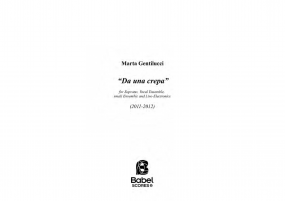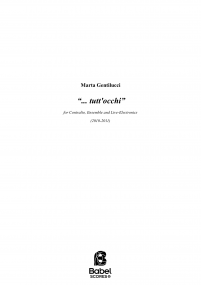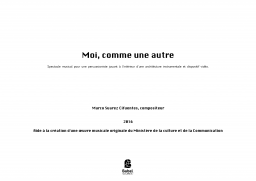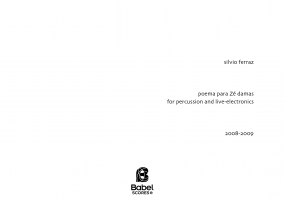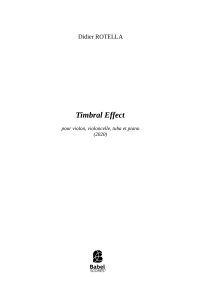Recherche avancée
Le Lethé
7,21 €
Version papier (+14,80 € impression et livraison ). Colissimo7-14 days aprox.
Version numérique (+0,00 €) à télécharger
Chez BabelScores, quand vous achetez une partition, vous pouvez ensuite contacter directement le compositeur ici même !
Caractéristiques
Region
North America (Canada - USA)
Estimated Duration
6 - 10min
Date
2005
ISMN : 979-0-2325-1409-3
In Stock
Notes sur cette pièce
Le Lethé
Le Léthé was conceived as traces and recollections of unconscious materials. We only hear them in the piece in disguised and deformed forms. Although the title refers to the oblivious flow, the piece is actually about remembering. The music that the listener experiences is this distorted recollection. It is the disguised narrative of the unconscious, whose actual content we can never know. The mechanisms of disguised musical ideas are modeled after Freud’s theory of interpretation of dreams. The first is condensation in which a number of musical ideas are compressed into a single one. This is the mechanism used when the electronics compress long instrumental gestures into a single sonority. It is also apparent in the instrumental part when gestures played by multi instruments move to single or more limited instrumental choices. The second mechanism is the displacement. In the piece, a musical gesture or a sonority is sometimes replaced by something corresponding to it. The idea of the whole gesture is then displaced and projected onto a part associated with it. Both mechanisms are employed to create a complex web of relationships of the musical materials. However, the general trajectory of the piece is quite linear, it moves from non-pitched instruments to pitched ones, while the electronics have a more destructive and transformative role in the beginning, more generative role towards to middle and no role at the end. The form of the piece functions in a very similar way to how memory functions in the case of a trauma. The blurred and disturbing memories are replaced by highly filtered, false and made-up memories of the events. The whole piece is then a deception of the memory.
Ajouter à une playlist
- Identifiez-vous pour créer une liste
Le Lethé
Le Léthé was conceived as traces and recollections of unconscious materials. We only hear them in the piece in disguised and deformed forms. Although the title refers to the oblivious flow, the piece is actually about remembering. The music that the listener experiences is this distorted recollection. It is the disguised narrative of the unconscious, whose actual content we can never know. The mechanisms of disguised musical ideas are modeled after Freud’s theory of interpretation of dreams. The first is condensation in which a number of musical ideas are compressed into a single one. This is the mechanism used when the electronics compress long instrumental gestures into a single sonority. It is also apparent in the instrumental part when gestures played by multi instruments move to single or more limited instrumental choices. The second mechanism is the displacement. In the piece, a musical gesture or a sonority is sometimes replaced by something corresponding to it. The idea of the whole gesture is then displaced and projected onto a part associated with it. Both mechanisms are employed to create a complex web of relationships of the musical materials. However, the general trajectory of the piece is quite linear, it moves from non-pitched instruments to pitched ones, while the electronics have a more destructive and transformative role in the beginning, more generative role towards to middle and no role at the end. The form of the piece functions in a very similar way to how memory functions in the case of a trauma. The blurred and disturbing memories are replaced by highly filtered, false and made-up memories of the events. The whole piece is then a deception of the memory.
Instrumentation
Percussions|Real-time Electronics|
Recording
Samuel Solomon - percussion
Score Details
Format - A3 /tabloid
Pages - 14
Pages - 14




![[/{_[Int] // M.}/////\] image](/images/stories/virtuemart/product/resized/5939.180328.183616_Intimate-Score2018_28-03-2018_285x285.jpg)
